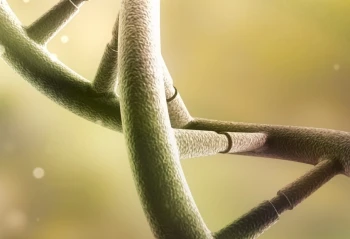Genetics
Every species has genetic variability. So do human beings. Such variable genes are called polymorphism. Examples include the genes that determine the colour of a person's hair or eyes. Genes are hereditary, which is why children share certain characteristics with their parents.
BPRC has a dedicated genetics research department, which focuses on genes for proteins that are part of the immune system. This system plays a major part in infectious diseases, autoimmune diseases and transplant rejections, all of which are fields in which BPRC conducts a great deal of research.

DNA consists of four chemical bases. The sequence of these bases inside a gene can differ from animal to animal. Thanks to a special technique, we can multiply any gene of our choosing. Using advanced equipment, we will then determine the sequence of the four chemical bases in this gene, which will then be expressed in a sequence of four letters (A, C, G, T). Genes are found in every cell of the body. Each gene contains the code for the production of a protein. These proteins control the biochemical processes. In a way, they are the ones carrying out all the work in our bodies.
The main focus area of our research
In our research projects we compare the similarities and differences between the genes of the various primate species (humans, apes and monkeys). Our research mainly focuses on the polymorphic genes of the Major Histocompatibility Complex (MHC) and the killer-cell immunoglobulin-like receptors (KIR). MHC proteins play a crucial role in the recognition of foreign organisms. And when an organ donor and an organ recipient have different MHC, proteins are involved in the transplant rejection. KIR proteins scan cells of the immune system for the presence or absence of MHC proteins. For instance, MHC may be absent from cancer cells or virus-infected cells. If so, KIR proteins will notice the absence and eliminate the cancer cells or virus-infected cells.
How we select the right animal for the right test
Proteins coded by polymorphic MHC partially determine whether someone is susceptible or resistant to a particular disease. We can use such MHC-typing to select the right animals for the right tests. This is a great thing, as it enables us to reduce the number of animals we need for experimentation purposes.
In order to safeguard the quality of the breeding programme for BPRC's colonies and in order to prevent inbreeding, we determine which MHC genes the animals will inherit.
How we share our expertise
We only need to sample each animal's blood once in order to isolate its DNA for genetic research purposes. We can also process white blood cells in such a way that these cells will continue to grow in a cell culture flask. In this way we will always have a source from which we will be able to isolate DNA again, even when its donor is no longer available. Everything we learn during these studies is shared with other research institutes through this database, which is curated by BPRC employees. In addition, we make DNA and cell lines available to other research institutes through our Biobank.